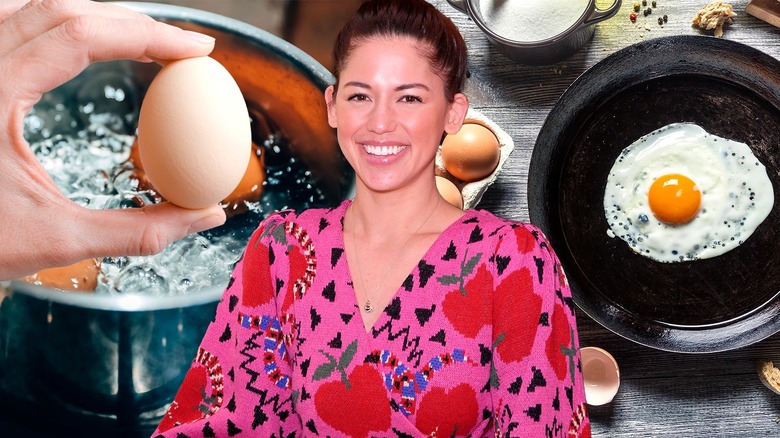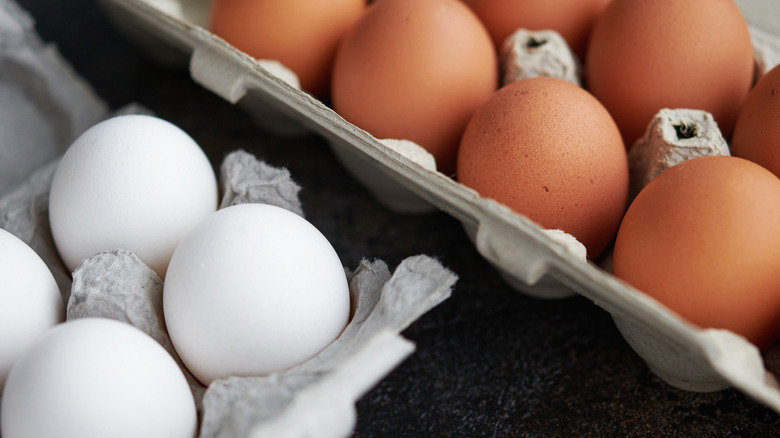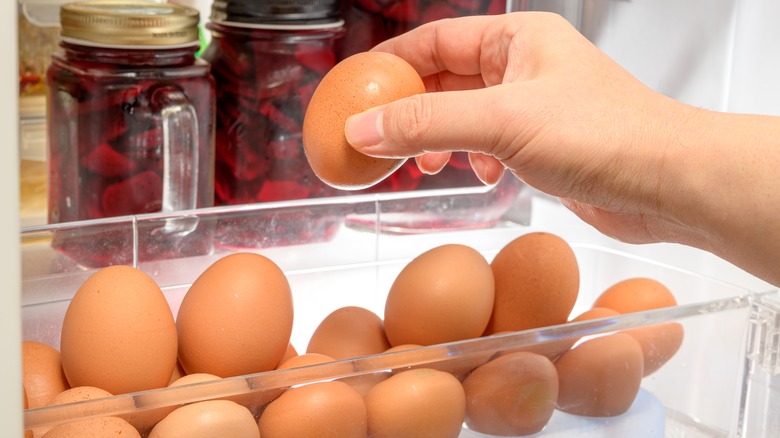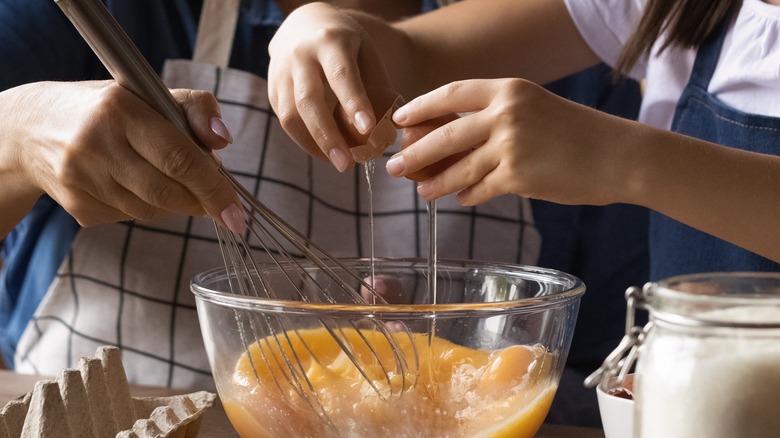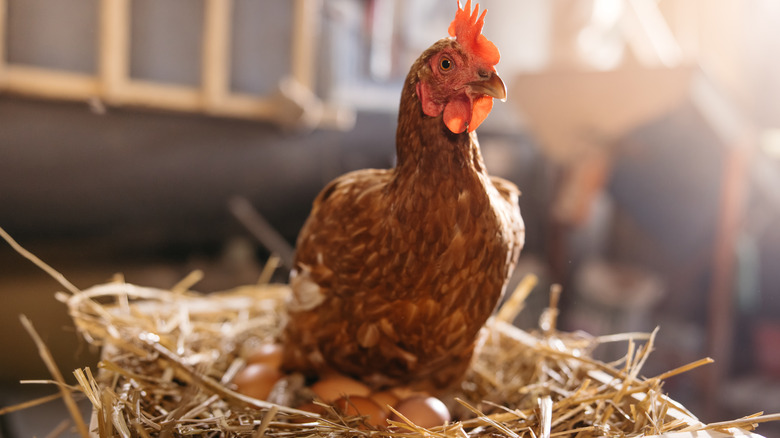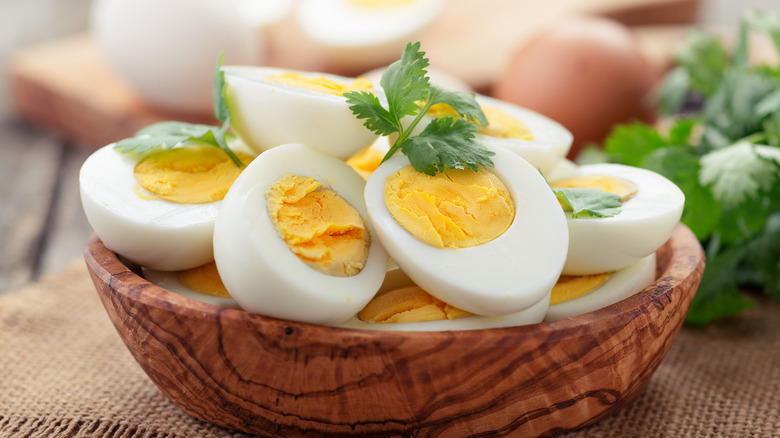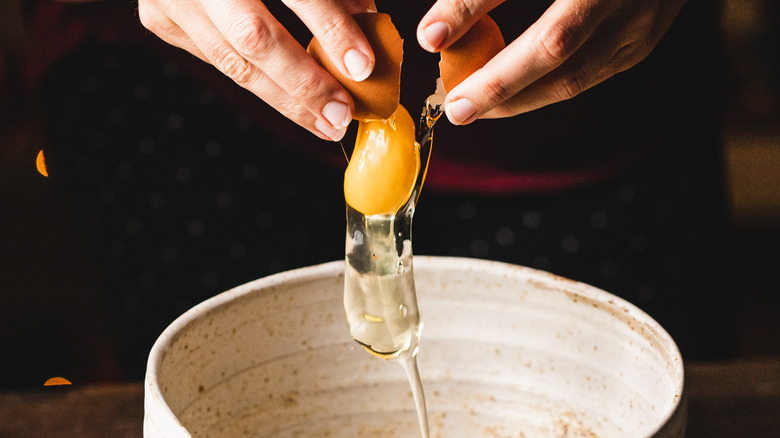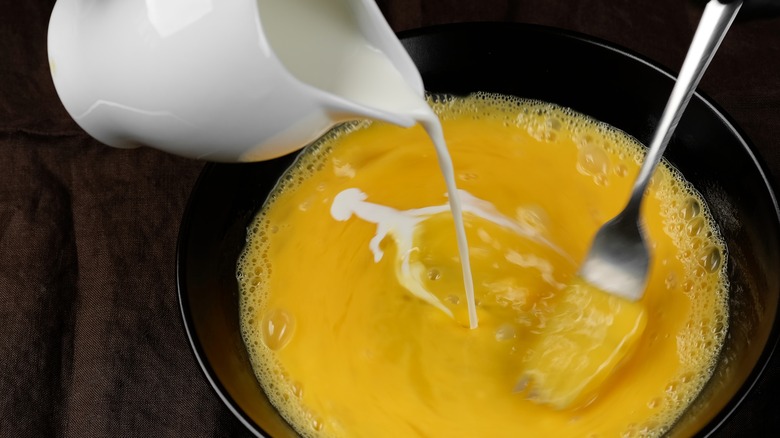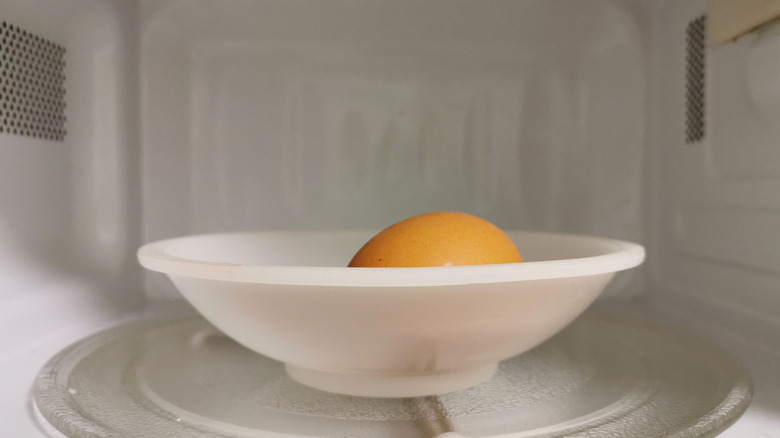10 Egg Myths You Can Stop Believing, According To Molly Yeh - Exclusive
Throughout her years living on a farm on the North Dakota-Minnesota border, "Girl Meets Farm" host Molly Yeh has raised a flock of chickens — "all named Macaroni," she reminded us — and two roosters named Tofu and Falafel. The home chef, who became wildly famous for her food blog, "My Name Is Yeh," recently released her third cookbook, "Home Is With The Eggs Are," a homage both to the food and her husband, nicknamed "Egg Boy."
The Food Network star sat down with Tasting Table to celebrate her recent collab with Blue Apron, for which she created limited edition meal kits inspired by her Asian and Jewish heritage, Midwestern farm surroundings, and her kids. We took advantage of her time to deep dive into her egg wisdom, uncovering and rebutting common egg myths that even Yeh once believed in. (Hot tip: the Ginger-Scallion Burgers in her Blue Apron Box include fried eggs for a truly exceptional experience. For best results, Yeh suggests that you fry your eggs in an already heated-up pan for "crispier edges," a contained final result, and a faster cook.)
If there's one takeaway from our conversation, it's this: Yeh probably knows more about eggs than you. "I'm so excited to see this, this is truly like the most in-depth that I've been able to get with eggs," she told us. We're excited too, Molly Yeh.
1. Brown eggs taste better than white eggs
Molly Yeh admits to discriminating when it comes to egg colors. When baking, the cookbook author and blogger goes for more inexpensive white eggs. If something like a scramble is on the menu, Yeh opts for more expensive brown varieties. For the record, it's not just Yeh who does it. Gordon Ramsay also used brown eggs when making a scramble for Jimmy Kimmel. Bobby Flay chose brown, too, when he showed off his scramble technique on The Food Network, as did Martha Stewart when she demonstrated her secret for a fluffy scramble for "Martha's Cooking School."
White eggs do come from different breeds of chickens than brown eggs. There is, however, no discernable difference between white and brown eggs when it comes to taste — at least not according to a small-scale test run by Consumer Reports in 2014. Why, then, do Yeh and other celeb chefs lean towards brown for stand-alone egg dishes? Maybe for the same reason that a picture of a brown egg — and not a white one — beat out even Kylie Jenner as the most-liked picture on Instagram in 2019. "Truthfully, I don't know if this is a Pavlovian thing where we've all been conditioned to think that brown eggs are fancier and more expensive," Yeh reflected.
2. You should always refrigerate eggs
Must you refrigerate eggs? It's an age-old question, and chicken owner Molly Yeh answered us. Eggs don't always have to be refrigerated, according to Yeh. It depends on where you're getting them from. Commercially bought American eggs should make themselves at home in the fridge. Eggs straight off the farm, however, are another story. Here's how Yeh explained it.
The "Girl Meets Farm" star won't stick the eggs laid by her farm chickens in the fridge because she trusts in their natural, protective coatings, otherwise known as cuticles. "[They] protect the pores from anything that's outside of the eggs, whether it's chicken poop or different dirt or insects or whatnot," Yeh said. While the home chef was quick to stipulate she's no "egg doctor," she's right. That protein-based coating does protect eggs from dangerous bacteria and is the reason you may have heard that Europeans adamantly do not refrigerate their eggs. Many European countries do not require its removal pre-sale.
Stateside, however, the United States Department of Agriculture requires that the cuticle be washed off commercial eggs to remove any dangerous contaminants that might be hanging out on the egg's shell. Ergo, Yeh does refrigerate anything that she buys in the supermarket. "When that coating gets eliminated, my understanding is that the refrigeration process does prevent any — or I guess it slows down what that coating is protecting against," Yeh said.
3. Only use room temperature eggs for baking
The Hermoine Grangers of baking have undoubtedly told you that eggs must be brought to room temperature for baking. Even Ina Garten — who is surely the loosey-goosy alter ego to Gordon Ramsay's kitchen devil persona — says that eggs are better at room temperature for things like cakes, cookies, and custards.
So, are your muffins doomed if you forget to remove your eggs from the fridge before making them? Not when push comes to shove, says Molly Yeh. "I'm a human, and I am super scatterbrained, so truthfully probably 70% of the time I don't think to take my eggs out in advance and bring them to room temperature," Yeh copped to us. Using cold eggs has never dramatically altered her end results. "It's ... hard to screw up a delicious combination of fat and sugar and eggs."
Be that as it may, special occasions call for extra effort. As per the home chef, bringing eggs to room temperature does ensure they won't interact negatively with temperature-sensitive ingredients like coconut oil or butter. In other words, room-temperature eggs make for smoother batters. Consider too, says Yeh, that if your batter is cold when it hits the oven, it'll need to bake longer. "If it's a room temperature batter it will bake up quicker, it will bake up more consistently," Yeh says.
4. The age of your eggs matters a lot
Food authorities love to tell you that egg age truly does matter, depending on the dish. Some advise that if you're poaching eggs, you should look for fresher varieties. That makes fried and scrambled eggs all-age friendly, right? Not according to food scientist Jessica Gavin, who swears that the less-firm yolks and runny whites associated with older eggs are bad news for poached, fried, and boiled varieties. Of course, if you put your faith in that principle, you'll be using fresh eggs for all stand-alone egg dishes. Only when baking will you permit yourself older versions.
So, should you start labeling your eggs by egg-laid date and sorting them according to their future food fates? Don't go down that rabbit hole, says "Home Is Where The Eggs Are" author Molly Yeh. The home chef doesn't herself pay heed to egg newness when creating a dish on her egg resume — think scrambles, poached, matzo brei, baked eggs, chocolate swirly buns, almond cakes, and meringues. The only time the cookbook author worries about the relative freshness of eggs is when boiling them. Fresher eggs might be harder to de-shell, but that's no biggy, either. "I always put mine in ice cold water to shock them, to seize up that coating, and that makes them easy to peel," Yeh explains.
5. Prick your eggs before cooking them
Let's ponder the art of boiling eggs a little longer, shall we? Celebrity chef Jacques Pepin is among the believers that pricking eggs before boiling them is vital to the success of the endeavor. Molly Yeh used to be like Pepin. "I had at one point one of those egg bakers that required the prick because it came with a special pricker," she told us. No special pricker, of course, is required if you watch Pepin do it. The Michelin-starred chef uses a thumb tack to poke a hole in the larger end of the egg, release air pressure, and achieve — per the theory — rounder results while preventing the egg from cracking prematurely in the pan.
It sounds great, but the science behind pricking your eggs before boiling them is much more ambiguous than Pepin might have you believe. Some scientists side with Pepin and maintain that creating an escape root for gasses makes an egg less likely to crack in the pan. Others argue that weakening egg shells via pricking makes them more crack-prone. What does Molly Yeh think? The home chef no longer pricks her eggs before boiling them and told us she hasn't noticed a difference.
6. Boiled eggs should be boiled
Did you really think we'd finished investigating the art of boiling eggs? Stick with us a little longer, while we delve deeper into heat. Cooking a hard or soft-boiled egg in water temperatures over 212 degrees Fahrenheit isn't going to give the culinary world a collective brain embolism, of course. Contrary to the preparation's namesake, however, lower water temperatures may achieve more perfect results. Molly Yeh simmers — instead of boiling — her eggs, for two reasons. First, she controls her eggs' cooking temperature better when simmering. Second, the home chef points out, boiling water tends to move an egg around the pan and crack its shells before it's ready for cracking.
Here are two Yeh-approved ways to make a boiled egg without boiling it. For a softer boil, says Yeh, boil your water, reduce it to a simmer, then add your egg and start the timer. "I love a six-and-a-half-minute egg," says Yeh. For a harder-boiled egg, Yeh suggests putting your eggs into the water and bringing it to a boil before turning off the heat and covering your pan. If you use this method, set your timer for the 10-minute mark.
7. Always season your eggs after cooking
Molly Yeh's mother also taught her daughter never to season her eggs before cooking them. "I grew up not seasoning my eggs while I was beating them, I would only season them at the end, so that became a personal nostalgic thing for me," the "Girl Meets Farm" star told us. According to one camp of cooking folklore — one that Gordon Ramsay once drilled into us on MasterChef — doing so keeps salt from breaking down the eggs and therefore yields less-watery results. The opposite camp believes that salts breaking down egg proteins is what we should all aspire to. You'll get more tender eggs!
Yeh now tentatively subscribes to the latter philosophy. "I have found that a pinch of salt will help prevent their weeping while they're cooking and they'll kind of help keep everything together," she told Tasting Table. "In my private life, I add a pinch of salt to scrambled eggs [before cooking them] but that's a very recent thing." If you're on the fence, do it both ways. Either will work. "Truthfully," Yeh admitted, "I don't notice a difference."
8. Butter is the only dairy your scramble eggs need
Some egg-cooking purists swear that milk or cream are distractions. You only need one dairy product to make scrambled eggs fluffy: butter. Molly Yeh grew up believing that, too. "My mom taught me to always add a splash of water to scrambled eggs because then it steams them and it makes them fluffy, and she told me that milk makes them a little bit gummy," she told us. For what it's worth, "Worst Cooks in America" host Anne Burrell would agree with Yeh's mom.
Is all dairy (minus butter) the devil when it comes to a good scramble? Not necessarily, Yeh told us. While Tasting Table's taste test recommends adding both milk and water to scrambles for optimal results, Yeh leans on other dairy additives. The chef stands by incorporating cream into her matzo brei and cream cheese into scrambled eggs. Browning agents aside, cream cheese can do wonders to save an overcooked egg. "If you accidentally overcook your egg by two seconds, you still have creaminess from the cream cheese, so that texture is still there," Yeh explained. "I guess it's a more forgiving scenario for a scrambled egg."
9. Eggs should never be microwaved
The jury is still out on frying eggs on a piping-hot window shield, but microwaving eggs may not be the cardinal sin it's cracked up to be. Before we continue, abstain from microwaving hard-boiled eggs (with or without their shells) for safety reasons. The science on this is a bit confusing, but the phenomenon is verifiable. Microwaving a hard-boiled egg seems to invite spontaneous combustions, even after you've removed it from heat.
Hard-boiled varieties aside, some egg preparations are microwave-friendly, according to Yeh. The Food Network star recently tried out a New York Times-sanctioned recipe for microwave-made "super fluffy eggs," and she swears they were delicious. "You have to beat it really, really well, and you microwave it and it gets almost souffle-like and really soft, and almost melts in your mouth," she told us. Make sure you follow a microwave-sanctioned recipe but don't assume your egg will taste the same as a stove-top version. "You're definitely going to get different textures, so if you're prepared for that difference in texture, then go for it."
10. Poached eggs are extremely hard to make
Molly Yeh doesn't add vinegar to her poached egg preparations, partly because she finds they "make the egg whites rubbery," but also because it's an extra step she often forgets. "I just simmer [my water] and add the eggs, and it's fine," she told us. "I don't do any [of those extra steps] — it's gotta be easy for me."
Poached eggs, easy? We were in disbelief at the culinary celeb's assertion. The dish, after all, has earned a reputation as notoriously complex! The key to mastering a poached egg, Yeh told us, is simply concentration. "Eggs, even within the large carton, there is some size variation, so to say 'oh boil it for exactly this time,' you know, that might not work," she told us. What does work is paying close attention to them as they cook. Yeh recommends cracking it into a shallow pan of water on a low simmer, then using a slotted spoon to lift the egg up once the whites are no longer translucent. The key is to give the egg "a jiggle," and thereby determine whether any of the egg white is still raw. A poke, on the other hand, will let you know how done the yolk is. "I know that's kind of tedious," Yeh reflected. "I guess that's why I don't cook a lot of poached eggs, because usually I crack the egg in, and then I have to go prevent my child from climbing on the counter."
